Key takeaways:
- Mastering genre conventions enhances a writer’s ability to connect with readers by establishing expectations and offering a creative framework for storytelling.
- Adapting and intertwining genre elements can lead to innovative narratives that surprise and engage audiences while retaining familiarity.
- Avoiding clichés and neglecting character depth can weaken a story; balancing originality with genre expectations ultimately creates richer, more resonant writing.
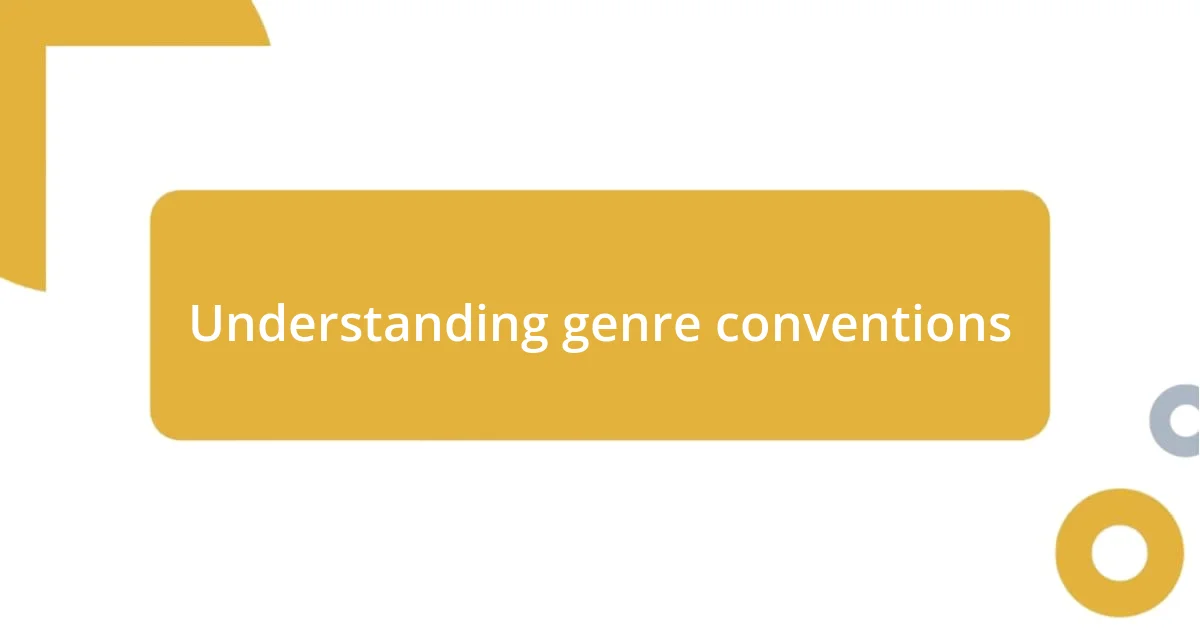
Understanding genre conventions
Understanding genre conventions is crucial for any writer aiming to effectively connect with their audience. I still remember the first time I attempted to write a mystery story, only to realize that I had overlooked key elements like suspense and red herrings. It was a humbling experience that taught me how genre conventions shape readers’ expectations.
When I think about genre conventions, I see them as artistic guidelines that serve both the writer and the reader. They offer a framework within which creativity can flourish. Have you ever noticed how certain tropes can evoke specific emotions? For instance, a heartbreaking love story instantly brings to mind feelings of longing or loss. I find this connection fascinating and empowering—it allows me to tap into what readers crave while still allowing for my own twist.
Engaging with genre conventions doesn’t mean stifling originality; rather, it’s about understanding the playground we’re all working in. I enjoy experimenting with established formulas, like incorporating humor in traditionally horror-driven narratives. These moments remind me that while conventions provide a foundation, they’re not limitations but rather springboards for innovation.
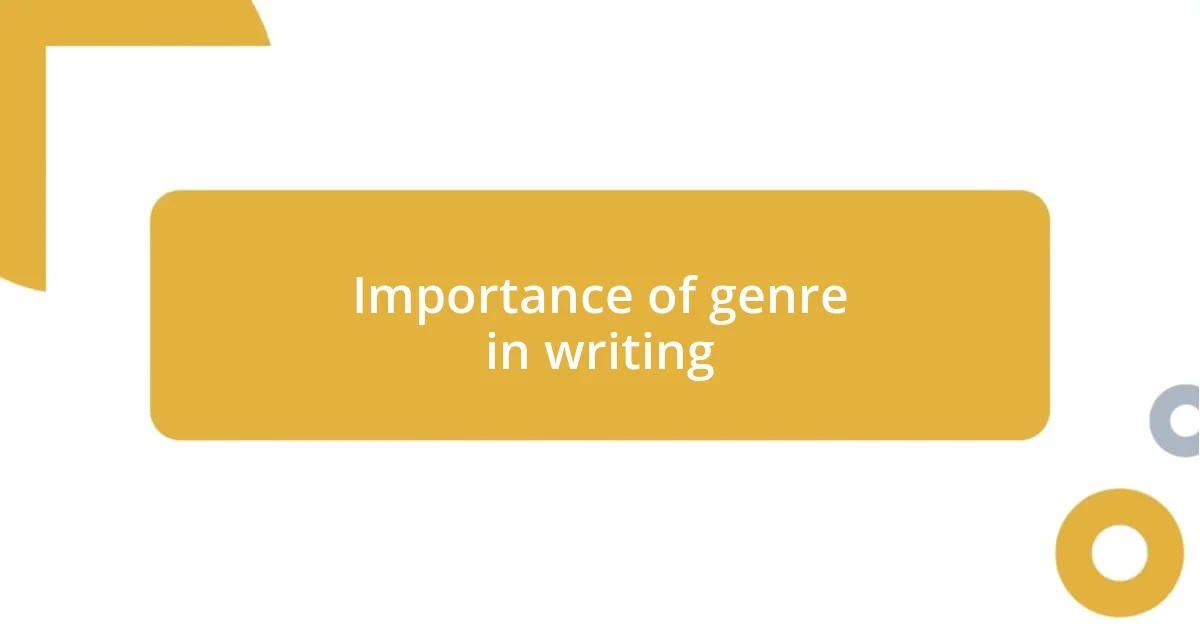
Importance of genre in writing
Genre plays a pivotal role in writing as it shapes both the creation process and reader perception. I recall a time when I tried to write a fantasy piece filled with philosophical musings, only to realize that my audience was craving the adventure and world-building typically found in that genre. This experience underscored how genre sets expectations; it’s a contract between writer and reader where clarity enhances engagement.
- Genre helps to categorize stories, making it easier for readers to find what they enjoy.
- It aids writers in honing their style, giving them a clear direction to follow.
- Understanding genre can elevate a writer’s ability to innovate, allowing for fresh twists within familiar frameworks.
- Readers often seek comfort in the familiarity of genres, which creates a sense of connection with the story.
- Genres can also influence marketing strategies, helping writers reach their target audiences more effectively.
In my journey, I’ve seen how mastering genre conventions can transform a simple idea into a compelling narrative that resonates. For instance, when I wrote a romance intertwined with elements of comedy, I delighted in the laughter and warmth it evoked in readers. This balance of expectations allowed me to create a piece that felt both innovative and satisfying. Recognizing the importance of genre is not just about keeping to the rules; it’s about redefining them to create something uniquely yours.

Analyzing popular genre examples
Analyzing genre conventions provides a window into understanding reader expectations and creating engaging stories. For instance, when I tackled a thriller, I noticed how essential pacing was. Initially, I struggled with keeping the tension high throughout the narrative, which sometimes led to dull moments. However, by carefully studying popular thrillers, I learned to strategically place twists and cliffhangers, which kept readers on the edge of their seats. This experience reaffirmed that analyzing genre examples isn’t just about imitation; it’s about extracting valuable lessons to improve my craft.
Take romance novels, for example. I remember reading a bestselling romance where the protagonists had distinct backstories that interwove meaningfully throughout the plot. This inspired me to create rich character arcs in my own writing, rather than relying on superficial chemistry. By digging deeper into the characters’ histories, I crafted a more resonant connection that drew reviewers’ hearts—hinting at how genre analysis can lead to profound storytelling.
Finally, the fantasy genre often showcases intricate world-building, which I find both a challenge and a delight. After attempting to create my own fantastical world filled with endless rules, I ended up lost in complexity. Studying beloved works taught me the value of balance: a rich setting paired with relatable characters makes the impossible feel real. This balance not only captivates readers but also allows me as a writer to explore my imagination without overwhelming either myself or my audience.
| Genre | Key Elements |
|---|---|
| Thriller | Pacing, Suspense, Twists |
| Romance | Character Development, Emotional Connections |
| Fantasy | World-Building, Relatable Characters |
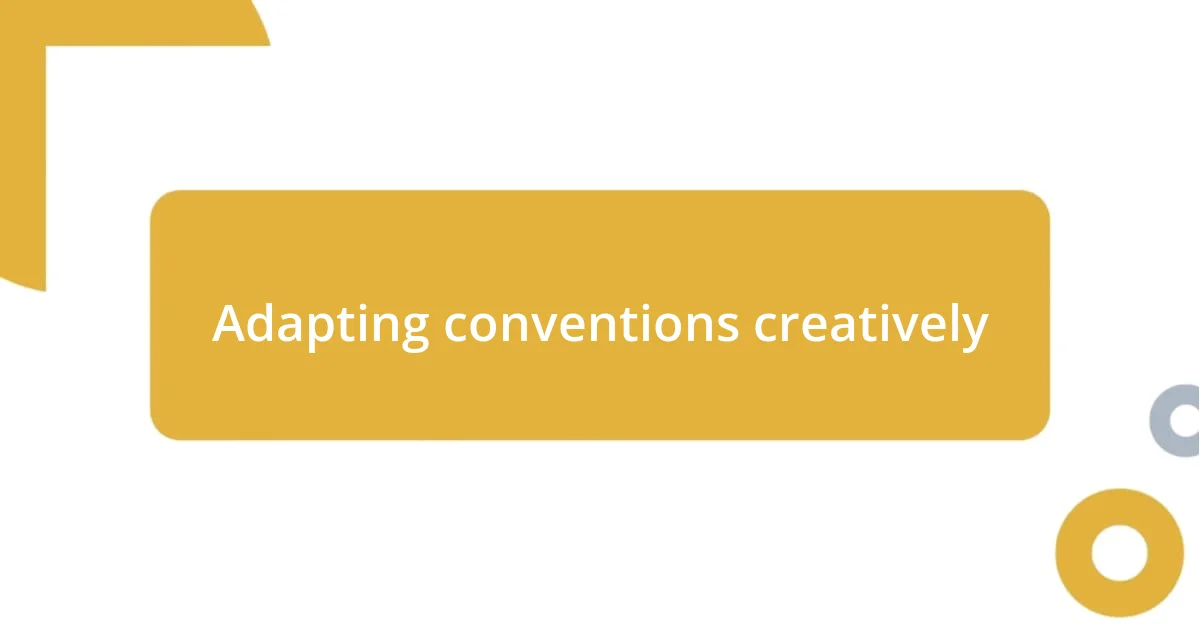
Adapting conventions creatively
Adapting genre conventions creatively can be a thrilling endeavor that breathes new life into familiar narratives. I remember when I decided to intertwine elements of science fiction within a historical fiction context. It felt like a risk at first, but the result was an unexpected blend that intrigued readers. By weaving futuristic elements into real historical events, I opened up new avenues for exploration and encouraged my audience to rethink the boundaries of both genres. Isn’t that what creative writing is all about—transforming the expected into the extraordinary?
One of my favorite experiences was when I infused horror conventions into a personal memoir. Rather than simply recounting my experiences, I approached them with a haunting tone, creating an atmosphere that pulled readers into my fears and vulnerabilities. This experimental adaptation made my story resonate in a way I hadn’t anticipated, as it blurred the lines between reality and the supernatural, allowing readers to experience my journey through a chilling lens. Have you ever considered how flipping genre norms might reveal deeper truths in your own work?
Ultimately, the process of creatively adapting conventions requires a willingness to explore and sometimes break away from traditional structures. Whether it’s a quirky twist on a classic trope or an unconventional narrative format, each choice offers a chance for growth. I’ve found that challenging myself to think outside the box leads to richer, more nuanced storytelling. It raises the question: what conventions have you thought about subverting in your writing? Embrace that exploration, and you might discover innovative paths waiting to be trodden.
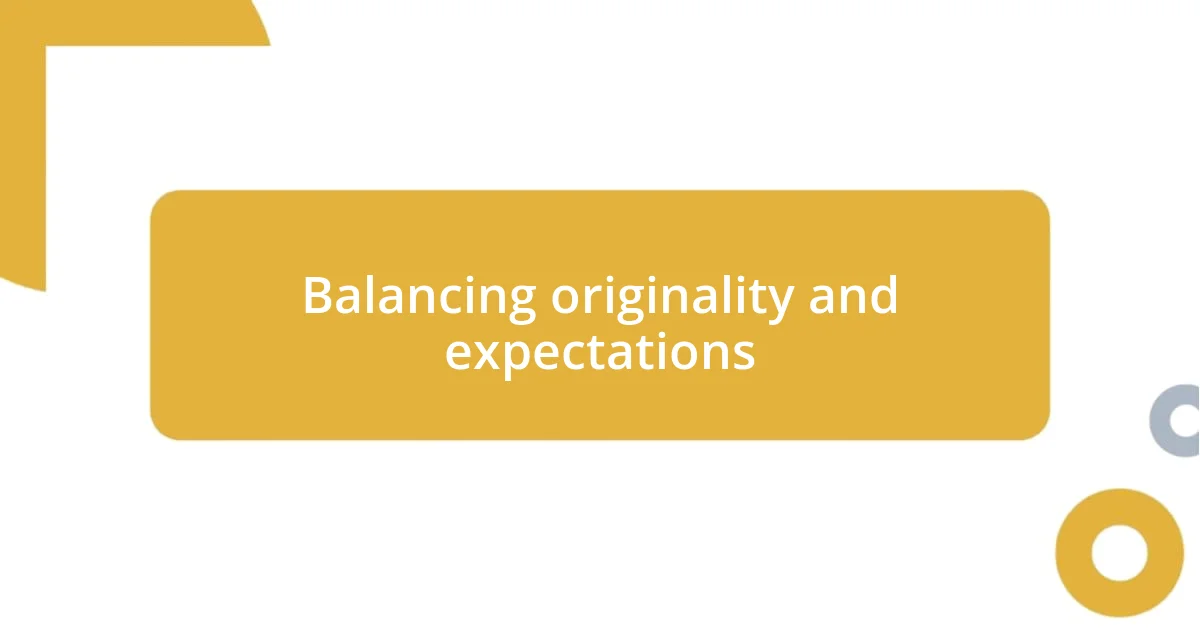
Balancing originality and expectations
Finding the sweet spot between originality and meeting reader expectations can be quite the balancing act. I often ask myself, “How can I surprise my readers without leaving them confused?” For instance, when I experimented with a mystery story, I was eager to break the mold with an unconventional protagonist. Instead of the classic detective, I created a seemingly unqualified librarian who accidentally stumbles upon clues. This twist not only played with expectations but also offered freshness while still retaining the familiar structure of a sleuth narrative.
I’ve learned that embracing genre conventions doesn’t mean relinquishing creativity. There was a time when I was terrified to follow common plot arcs in my young adult novel, thinking it would strip away my voice. However, as I embraced typical tropes—like the coming-of-age journey—it allowed me to infuse my personal experiences, lending authenticity to my characters’ struggles. Have you ever felt constrained by the need to conform? I realized that using expectations as a framework rather than a cage can lead to unique narratives buzzing with originality.
Ultimately, it’s about finding joy in the blend. I remember writing a short story where I fused elements from the fantasy and contemporary genres. I was explicit with my elements while letting my characters redefine them through their personal journeys. Readers appreciated the grounded themes amidst magical realism, proving that originality can coexist harmoniously with genre expectations. How do you see your creative voice evolving within the realms of genre? It’s a fascinating exploration!
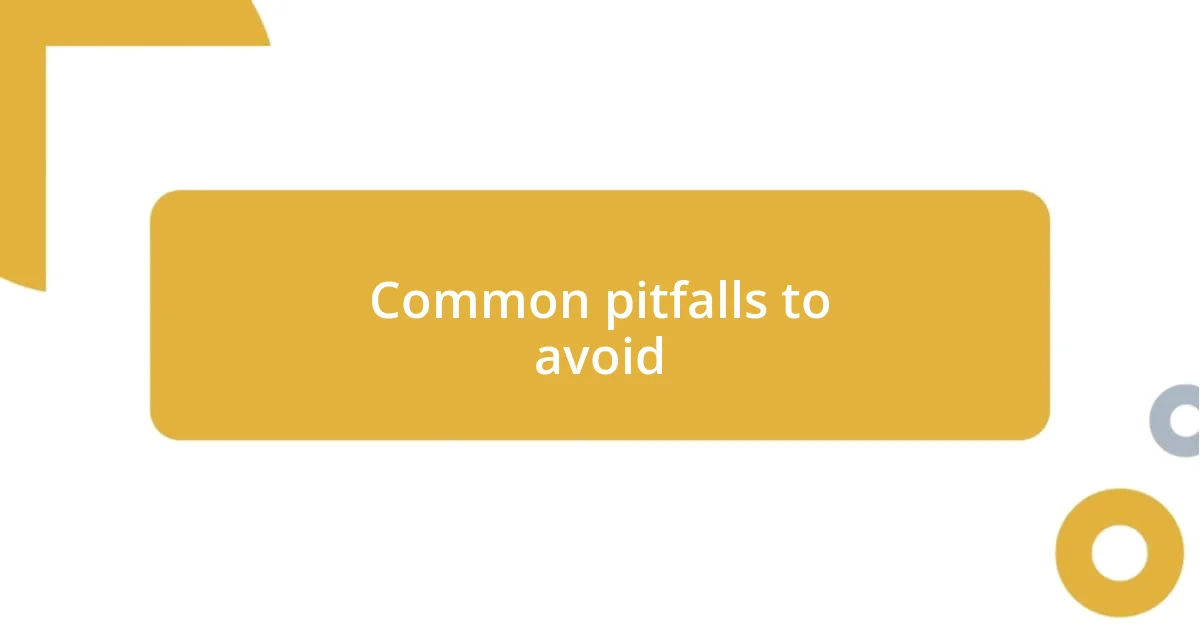
Common pitfalls to avoid
One pitfall I’ve encountered is falling into the trap of clichés. I remember starting a romance story and almost relying on the old “opposites attract” trope without considering how overused it is. While it can work in some cases, I learned that such clichés can sap energy from my writing, making it feel predictable. Avoiding these worn-out phrases pushed me to explore fresh dynamics and create characters that truly resonate.
Another trap is neglecting the emotional journey of characters. Early on, I wrote a thriller where the twists were compelling, but the protagonist felt flat and unrelatable. Readers want to connect on an emotional level; otherwise, what’s the point? By digging deeper into my characters’ backgrounds and motivations, I transformed the narrative into something that not only thrilled but also had heart. Isn’t it enriching when characters breathe life into the story?
A common misconception I’ve battled is the belief that adhering strictly to genre rules will guarantee success. I once submitted a fantasy piece that adhered to every expected convention, thinking that would make it stronger. However, it resulted in a story that lacked vibrancy and originality. I learned that it’s essential to bend the rules while still respecting the genre. Have you ever felt constrained by definitions? Blending traditional elements with your unique perspective adds authenticity and flair, ultimately elevating your work.
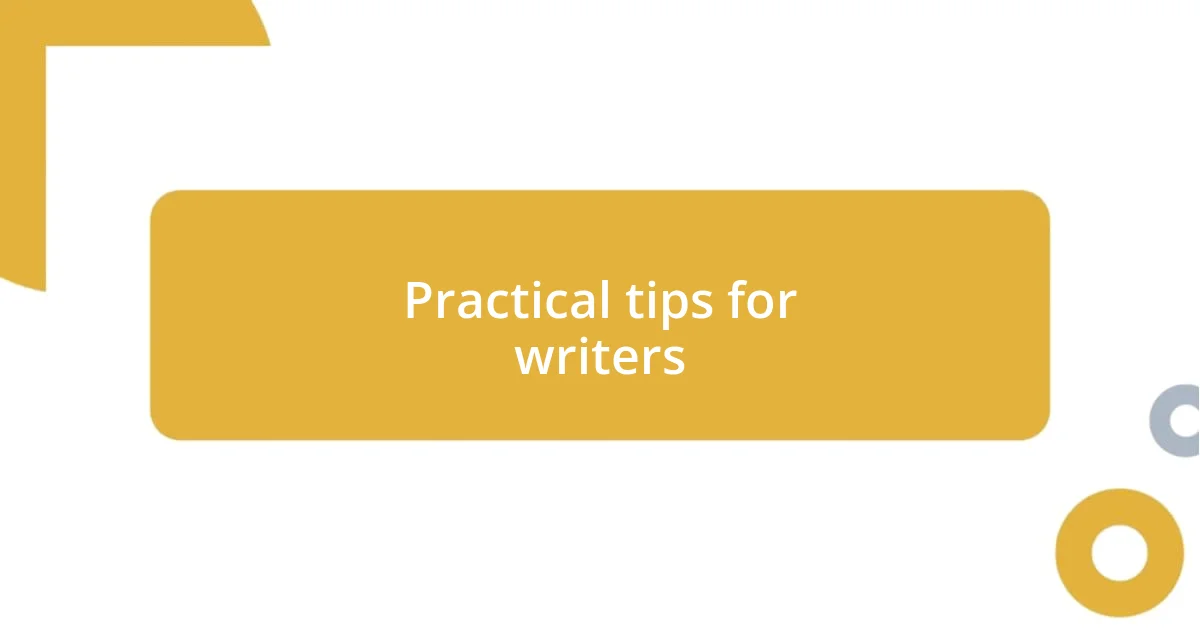
Practical tips for writers
When tackling genre conventions, one practical tip I swear by is to actively read within your chosen genre. I remember diving deep into a collection of contemporary novels when I was crafting my own. It changed my perspective entirely. Observing how established authors maneuver within conventions while adding their own flavors not only inspired me but also provided invaluable lessons on pacing, character development, and setting. Have you ever noticed how certain narratives can make a familiar plot feel new? That’s the power of understanding genre nuances.
Another helpful strategy is seeking feedback from fellow writers or critique groups. Sharing a piece that flirts with genre tropes can yield surprising insights. For instance, I shared a draft that intertwined mystery and romance, and one member pointed out how certain scenes mirrored popular romances. That feedback encouraged me to either enhance those moments or shift them to stay fresh and engaging. It’s crucial to remember that an outside perspective can illuminate blind spots I didn’t even realize existed. Isn’t it great when others help reveal pathways I hadn’t considered?
One thing I’ve embraced is the beauty of mixing genres. Whenever I felt hemmed in by strict conventions, I’d remind myself that the boundaries are fluid. I vividly recall blending sci-fi with humor in a short story; the result was both unexpected and delightful. This fusion not only challenged my writing skills but also opened doors to unique storytelling. Have you tried entwining different genres? It could lead you to your most authentic writing yet!













